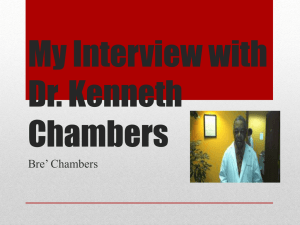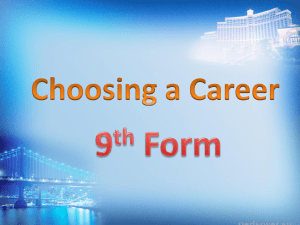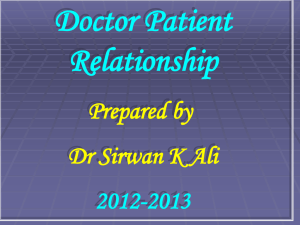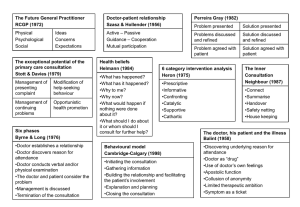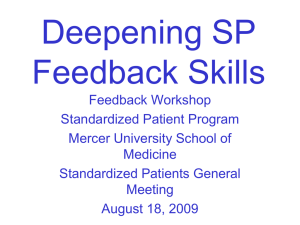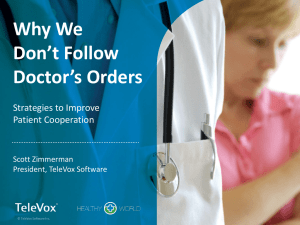DOCTOR MEDICINE - Asociatia Balint din Romania
advertisement
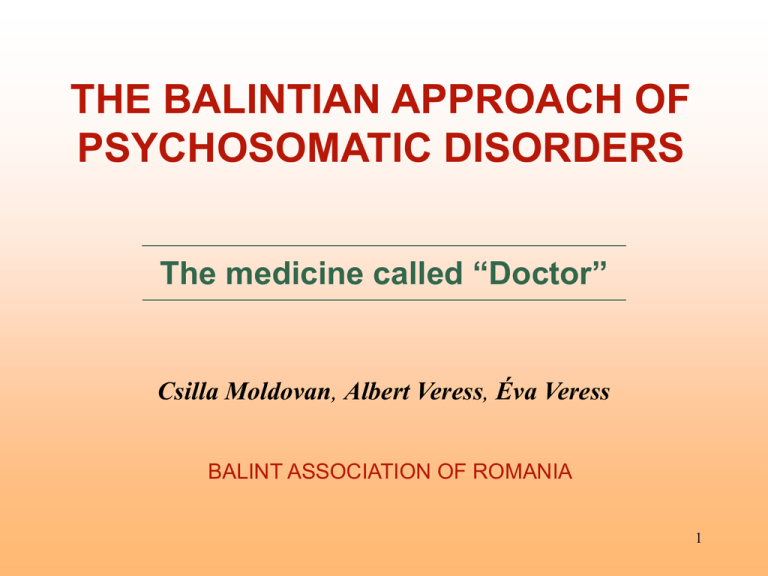
THE BALINTIAN APPROACH OF PSYCHOSOMATIC DISORDERS The medicine called “Doctor” Csilla Moldovan, Albert Veress, Éva Veress BALINT ASSOCIATION OF ROMANIA 1 Michael Balint in his work “The Doctor, his Patient and the Illness” opened new perspectives in understanding psychosomatic disorders and launched the notion of “The doctor as a medicine” 2 PRESENTING THE “MEDICINE” „The doctor is an entity for the benefit of others” (Scripcaru) The doctor is the MEDICINE The active substance of this medicine is THE DOCTOR’S PERSONALITY conditioned by biological-psychological-social factors BPS MODEL of ENGEL The doctor-patient relationship is a critical component of the BPS model 3 The Biological System The biological factors condition the biological functioning of the doctor of the patient 4 The Psychological System The psychological factors shape The personality of the patient influences the motivation of the patients attitude towards their illness The personality of the doctors influences the professional motivation and his attitude towards perceiving and experiencing suffering 5 THE SOCIAL SYSTEM THE SOCIAL FACTORS Influence The appearance and the treatment of the illness THE PATIENT Expresses and experiences the illness depending on the social, cultural, familial, ethnic customs THE DOCTOR His personality is influenced by the way he perceives the role of the doctor 6 THE WAY THE MEDICINE IS PRESENTED “Each doctor creates a unique atmosphere” M. Balint The overactive doctor: authoritarian in the doctor-patient relationship, leads the treatment The partner doctor: equality in the doctor-patient relationship, treatment goes on in collaboration with the patient 7 All-knowing doctor: paternalistic, treatment is conducted by the doctor with a teacher-student-like subordination of the patient The friend doctor: in most cases such a relation does not work The Balintian doctor: the best ailment in treating psychosomatic disorders. 8 THE BALINTIAN DOCTOR “ The doctor as medicine” M. Balint ADVANTAGES Reveals the pathogenetic effects of psychosomatic disorders Focuses on PS illnesses as a consequence of poor communication, isolation, and problems of making a living Satisfies the communicational needs of the patient Makes a survey of all possible solutions to the patient`s problems Reveals new perspectives in solving these problems 9 CHARACTERISTCS AND EFFECTS Confines to the saying: “NIL NOCERE” PSYCHOSOMATIC DISORDERS are considered to be a consequence and expression of PROBLEMS OF EXISTENCE and PROBLEMS OF COMMUNICATION The best medicine will be the doctor who satisfies the patient`s need of communication 10 CHARACTERISTICS OF THE “DOCTOR MEDICINE” AND HIS EFFICIENCY • Capability of empathy: putting himself into the patient`s situation. The patient expects understanding • Capability of listening: by keeping silence and listening, the doctor will eventually break the patient`s resistance, the first step towards communication • Capability of listening without judging: will help assess the objective situation of the patient • Tolerance, flexibility and sensitivity with the patient a communicating doctor-patient relationship will be settled 11 CHARACTERISTICS OF THE “DOCTOR MEDICINE” AND HIS EFFICIENCY • Capability of changing his emotions towards the patient: will produce a change in the situation of the patient, the possibility of accepting a terminal situation • Capability of intuition and realization of the awareness of the transfer and countertransfer in the doctor-patient relationship : will help the doctor control his emotions towards the patient • Capability of accepting that recovery means autonomy: this liberates the patient from the relationship 12 PHARMACOKYNETICS “The way the doctor offers himself to the patient depends on his personality rather than the needs of the patient” M.Balint The doctor as BPS model conditions the doctorpatient relationship The pharmacological action of the “Doctor Medicine” conditions The quality of Doctor-patient-illness relationship 13 THE PHARMACOLOGICAL ACTION OF THE “MEDICINE” • Assessing the doctor patient relationship • Assessing the tensions in the life of the patient • A good understanding of the complex interpersonal factors such as transfer and countertransfer • The correct assessment of the dynamics of the doctor-patient relationship 14 HOW DOES THE “DOCTOR MEDICINE” ACT UPON BPS? PS symptoms express vital situations of the patient The patient can not or does not want to deal with these problems The problems of existence becoming illness-generating problems 15 HOW DOES THE “DOCTOR MEDICINE” ACT UPON BPS ? In a lucrative relationship, where communication is possible, the doctor can prompt the “BALINTIAN FLASH” by spontaneously sharing thoughts, free association and all this will certainly cast light upon the basic problems of the patient “HERE AND NOW” 16 THE PLACEBO EFFECT • Depends on the efficiency of the “medicine” • trust in the curing doctor • the effect can be correlated with the apostolic function of the doctor, who converts the patient to his own ideas • The pharmacokinetics of the medicine called “doctor” is also influenced by the way the medicine is administrated • This “magic ritual” of administration medicine can have a considerable effect on the patient, increasing the therapeutic efficiency of the medicine 17 THE INDICATION OF THE MEDICINE The psychosomatic symptoms, which are linked to a vital problem can be the etiopathogenic factors in the genesis of the psychosomatic disorders: social isolation, lack of communication, job difficulties, lack of satisfaction in love, lack of feelings, collapsing of traditions, uncertain daily existence, no perspectives for the future, accepting and idealizing compromises, moral crisis In this situation there is nobody to receive the cry for help... BUT the body of the patient itself, which will turn the problems from outside into somatic inner ones, and finally the patient will call the doctor. 18 DOSAGE OF THE “DOCTOR MEDICINE” Is determined by the: • Gravity of the PS disorders • Tolerance towards the medicine • The development and intensity of side effects In case of overdosing, the antidote could be: GIVING UP THE RELATIONSHIP! 19 LIMITS IN ADMINISTRATION The “Doctor Medicine” acts upon the Patient and his Environment BPS factors can limit its action The family is also a BPS system with specific dynamics. The “Doctor Medicine” can balance this system: It could be a ”shock absorber “ in the system. Only by being present, he absorbs the negative shocks, making it possible for the others to live along with the problems The system keeps on going against expectations, even if the problems persist. 20 LIMITS IN ADMINISTRATION The doctor may experience unpleasant emotions while playing his therapeutic role, thus limiting the efficacy of the „Medicine” NEGATIVE EFFECTS: The “medicine” cannot replace the poor social protection the ethnic, cultural and religious beliefs, the financial and social situation of the patient. POSITIVE EFFECTS: He could change the thinking of the patient, his status in the family, and could help him get through the emotional experiences due to the PS disorders 21 SIDE EFFECTS OF THE “DOCTOR MEDICINE” The countertransfer of the doctor is the result of the influence of the patient on the unconscious mind of the doctor, and this will lead to an improper attitude with the patient: aggressiveness, anger, indifference, unmotivatedly keeping the patient inside the relation, iatrogenic effects. The doctor may crave for power (Adler) This is to hide his inferiority as a medicine, feeling incapable of making a relationship and communicating with the patient. His anxiety, the uncertain diagnosis will only add to it. “The doctor may become a `little dictator` to the patient” (Lanchland) 22 SIDE EFFECTS OF THE “DOCTOR MEDICINE” Doctor`s self defense is an adverse reaction as a defense against professional frustration. The behavioral stereotypes are: -refusing the patient, the doctor will suggest that the patient is in fact not ill at all. -endless referrals to other specialists and paraclinical investigations Exaggerating the apostolic function: the doctor tries to convert the patient to his conception about the illness; he feels omnipotent as if he knew all, the doctor is vulnerable to criticism from the patient, and feels hurt if patient leaves him. 23 SPECIAL NOTICE ON USING THE “MEDICINE” There are three sorts of treatment: prophylactic, therapeutic and maintaining. Use and efficacy of the medicine called “doctor” also depends on the duration of treatment. The better a doctor is appreciated, the more patients he must deal with. Consequently, he will have less time to communicate with the patients. Thus, more patients will leave him for other, possibly less efficient doctors, but who have more time at their disposal. 24 The End Sfârşit Vége Konec 25 TENC IU VERI MACI!!! 26


